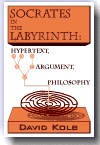Friday, 10/27, 2017
12 Noon-2 p.m. PDT
Live on YouTube and F2F in Electronic Literature Lab, WSUV Campus, VMMC 211A
#elitpathfinders
Experience a performance––what Stuart Moulthrop and I call a “Traversal”––of an early creative hypertext essay: David Kolb’s Socrates in the Labyrinth (Eastgate Systems, Inc., 1994).
This is a live performance streamed on YouTube and also captured in video in the Electronic Literature Lab. To access the work, we will be using the CD-ROM copy from The Grigar Collection running on an iMac G4 “Mushroom.” Performing the Traversal is the author, David Kolb. Guests can view the Traversal in person at Multimedia Classroom Building, Room 211B, or online at https://www.youtube.com/watch?v=kXJIcWctuDM. The event begins at 12 noon PDT and will end at 2 p.m. PDT.
Schedule
- 12-12:30 p.m.: Pre-show including John Barber’s soundscape, live feed of set up, videos, and introductory comments
- 12:30-1:00: David Kolb’s Traversal
- 1:00: Q&A with David Kolb and Dene Grigar
During the Traversal we will be posting photos and commentary on Facebook and Twitter.
Media Channels
YouTube: https://youtu.be/DxDUCGzfDl8
Facebook: https://www.facebook.com/elitpathfinders/
Twitter: #elitpathfinders
Storify: https://storify.com/nnschiller/david-kolb-s-socrates-in-the-labyrinth-a-live-e-li
From Wikipedia: “David Kolb is an American philosopher and the Charles A. Dana Professor Emeritus of Philosophy at Bates College in Maine.
Kolb received a B.A. from Fordham University in 1963 and an M.A. in 1965. He later received a M.Phil. from Yale University in 1970 and a Ph.D. in 1972. Kolb’s Dissertation was titled “Conceptual Pluralism and Rationality.” Most of Kolb’s writing deals with “what it means to live with historical connections and traditions at a time when we can no longer be totally defined by that history.” Professor Kolb taught at the University of Chicago before moving to Bates in 1977 and teaching there until 2005, when he took emeritus status.”
 About Socrates in the Labyrinth
About Socrates in the Labyrinth
“Socrates in the Labyrinth is a wide-ranging exploration of the relationships between hypertext, thought, and argument. Does hypertext present alternatives to the logical structures of if-then, claim and support? Is hypertext a mere expository tool, that cannot alter the essence of discussion and proof? Or is hypertext essentially unsuited to rigorous argument?

Kolb’s discussion is a nuanced, creative approach to these and other questions. Kolb points up the history of nonlinearity in philosophical work, from the Socratic dialogues through Hegel, and the variety of forms that philosophical discussion can take. Kolb’s discussion — and the structures of Socrates itself — show that hypertext is not only a “super-encyclopedia” that leaves the essence of argument unchanged. But his keen understanding of both hypertext and postmodernism also shows that the relation between hypertext and “the end of the text” is more complex than is sometimes claimed. Socrates in the Labyrinth embodies several hypertext structures showing possibilities for writing and thought in the new medium.
Socrates in the Labyrinth is one of the first works of hypertext non-fiction to examine and exploit the techniques of hypertext rhetoric discovered in the development of serious hypertext fiction.
Socrates in the Labyrinth was created using Storyspace.”–Eastgate Systems, Inc.
Reviews & Critical References
Carbone, Nick. “Socrates in the Labyrinth: David Kolb Re-Thinks Argument and Philosophy.” Kairos 1.1. Spring 1996. http://kairos.technorhetoric.net/1.1/reviews/carbone/socstart.html.
Fenty, Sean. “Sprouting the Line: How Hypertext and Philosophy Meet in David Kolb’s Socrates in the Labyrinth.” Blesok no. 25, March-April, 2002. http://www.blesok.com.mk/tekst_print.asp?lang=eng&tekst=391.
Tosca, Susana Pajares. Hipertulia. “Review of David Kolb’s Socrates in the Labyrinth.” http://pendientedemigracion.ucm.es/info/especulo/hipertul/socrates2.html.
To join us in the Electronic Literature Lab for the Traversal, or to get more information about the event, contact Dr. Dene Grigar, dgrigar[at]wsu.edu.
This event is part of the year-long “Born Digital Preservation Series” celebrating the Electronic Literature Organization’s move to Washington State University Vancouver. It is sponsored by Washington State University Vancouver, Electronic Literature Organization, and the Lewis E. and Stella G. Buchanan Distinguished Professorship.
Organizers: Dene Grigar, Nicholas Schiller, Greg Philbrook, Vanessa Rhodes, Veronica Whitney, Mariah Gwin, and Katie Bowen.

